Are you someone who likes to prepare well in advance for your solo trips by learning the local language? In my opinion, it is one of the best ways to immerse yourself in the culture of the country you are visiting. Not just that, you also get to make friends easily in a foreign destination! Also, when you know the local language, it sends out a signal to the scammers that you are not the type of tourist to mess with!
Now, when it comes to Bali, there are actually two popular languages that most residents speak—Bahasa Indonesia and Basa Bali, also known as Balinese. Bahasa Indonesia is a universal language that you may find people speaking in other islands as well. But Basa Bali is mainly spoken in Bali, and you will find a majority of the locals speaking only this!
If you are planning on visiting the rest of the Indonesian island, too, then learning a bit of Bahasa Indonesia wouldn’t hurt. You can even speak this language in Bali. But if you are travelling only to Bali, then learning Basa Bali would be more than enough. You may feel that learning a whole new language just for a solo trip may not be entirely possible. But Basa Bali is a fairly simple language, and you can learn just the basic phrases and words for your solo trip to the island!
1. Permisi
Pronunciation: per-me-see
Translation: excuse me
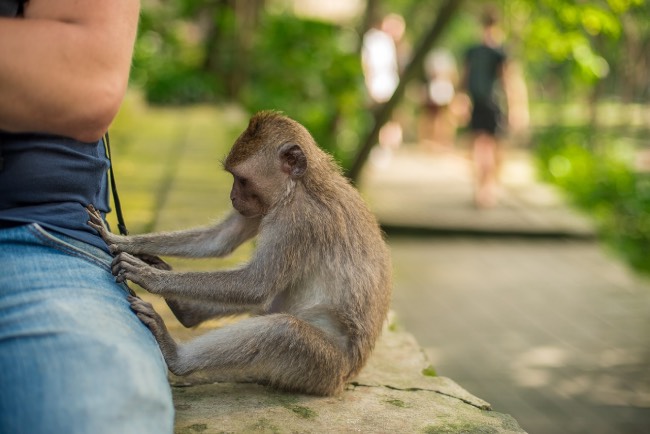
This is probably one of the most important Balinese phrases. It can be used pretty much everywhere, to initiate a conversation or even when you are in a crowded destination.
Also, this phrase is very easy to learn. Its pronunciation is quite similar to that of the English word ‘permission,’ so you wouldn’t have any problem remembering it!
2. Terima kasih
Pronunciation: te-ree-ma ka-seeh
Translation: thank you
Good manners cost nothing, and in Bali, these are considered the height of respect and courtesy. A simple phrase such as ‘thank you’ in Balinese would let the people know that you respect them and their culture and are taking the extra effort to learn their local language! You can use this phrase pretty much everywhere too.
3. Sama sama
Pronunciation: sah-ma sah-ma
Translation: you are welcome

This is another phrase that can come in handy when someone is polite to you. You may think that it is a tiny phrase, but it will mean a lot to the locals. Also, when they see you taking a step towards learning their language, they will help you in every way possible to ensure you have a great time on their land!
4. Ya – Tidak
Pronunciation: ya – tee-dah (the k remains silent when you pronounce Tidak)
Translation: yes – no
These simple words, both easy to learn and pretty useful, can go a long way when you are responding to something. You can use them either to politely agree with something or reject an invitation for drinks when you are not comfortable! Also, you can pair these words with other phrases such as ‘no, thank you, and you get ‘tidak, terima kasih.’
5. Saya tidak mengerti
Pronunciation: saa-yha tee-dah me-nger-tee
Translation: I don’t understand
You will come across a lot of locals who speak both Balinese and English well. But if you ever face any difficulty understanding what people are saying, you can simply use this phrase to let them know that you are not well-versed with Balinese. The locals appreciate honesty more than anything. If the person you are interacting with knows English, you can politely ask them to speak English to make the conversation easier.
6. Tolong
Pronunciation: toh-long
Translation: please
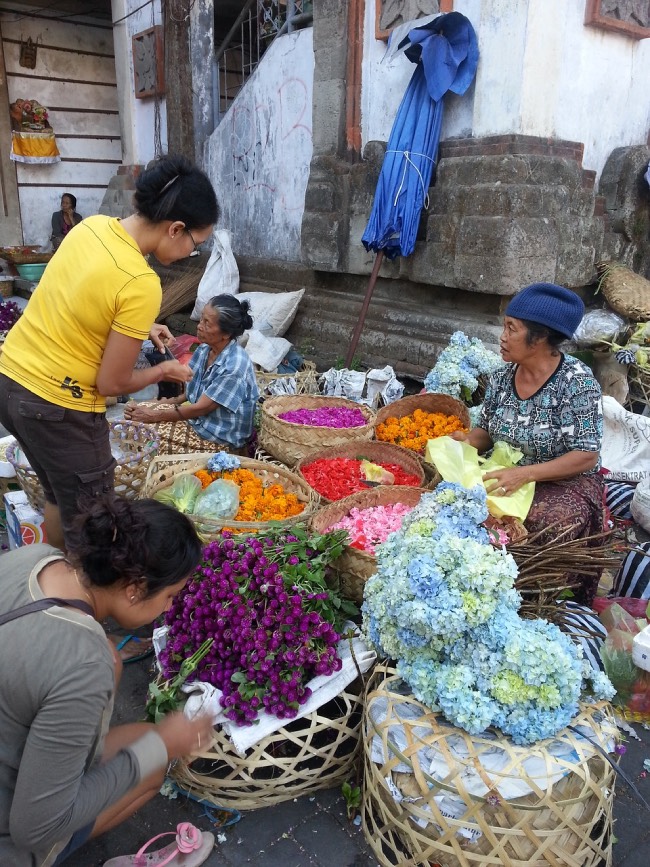
This simple, polite word can be helpful in many situations. You can even pair this with other words/phrases such as ‘yes, please’ and you get ‘ya, tolong.’
7. Nama saya [your name]
Pronunciation: nah-ma sah-yah [your name]
Translation: my name is [your name]
This is one of the most useful phrases you can learn for your solo trip to Bali. It is important that you are able to introduce yourself whenever needed. You can easily start conversations with this phrase and make new friends on your solo trip.
8. Namamu siapa?
Pronunciation: nah-ma-moo see-aa-pah
Translation: what is your name?
Once you introduce yourself, it is only polite to ask the other person their name. This phrase will make it sound like you are interested in the conversation and would love to know more about the person. If the other person seems interested too, you can take the conversation forward and tell them that you have visited Bali on a solo trip!
9. Apa kabar?
Pronunciation: ah-paa ka-bah-ar
Translation: how are you?
This simple phrase will be helpful when you ask about the well-being of the people you talk to in Bali. Also, you can use this phrase to know how a person’s day is going in Bali. Once that has been asked, you can tell them about your day too!
10. Kabar baik
Pronunciation: ka-bah-ar ba-ee-k
Translation: I’m good
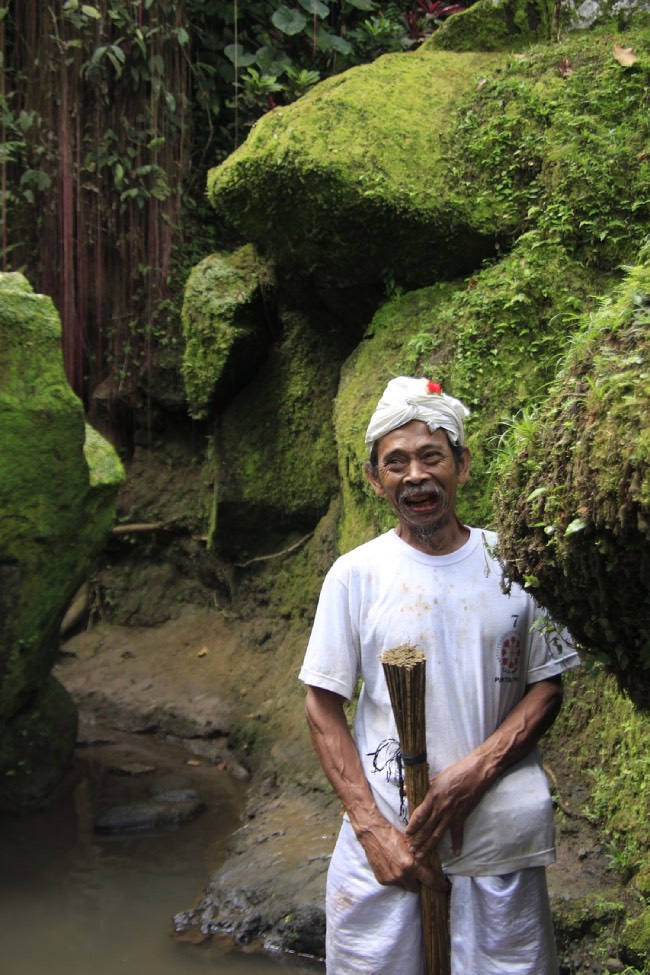
You can use this phrase when someone asks you, ‘how are you?’. It is a simple yet important phrase to keep a conversation going in a polite manner.
11. Saya dari [name of the place]
Pronunciation: sah-yah da-ree [name of the place]
Translation: I’m from [name of the place]
This is another phrase that can be used in a conversation. While interacting with locals, you can let them know which country you are from with this phrase. If the other person seems interested, you can even tell them something interesting about your home country to keep the conversation going!
12. Permisi, saya tersesat
Pronunciation: per-me-see saa-yah ter-seh-saat
Translation: excuse me, I’m lost
If you are visiting Bali for the first time, chances are you may get lost in certain areas. And don’t worry, it is okay as long as you get back to your destination safely.
If you do get lost, you can use this simple phrase to use with the locals or other people around. Surely enough, you can use the Maps on your smartphone to look for directions but asking a local is less time-consuming and less confusing.
If you get lost in an area with poor network connectivity, even your smartphone may not be able to help you. So it is important to learn this phrase!
13. Permisi, saya pergi ke [name of the place]
Pronunciation: per-me-see saa-yah per-gee ke [name of the place]
Translation: excuse me, I want to go to [name of the place]
If you face any difficulty in getting to a certain location, you can ask the locals about it. Using this phrase will let the locals know where you want to go, and they can provide you with the best way to get there. Again, as I mentioned earlier, you can surely use your smartphone to get directions. But in certain cases where the network is poor, or your phone’s battery dies, this phrase will save you!
14. Di mana toilet/washroom?
Pronunciation: dee ma-nah toilet/washroom
Translation: where is the toilet/washroom?
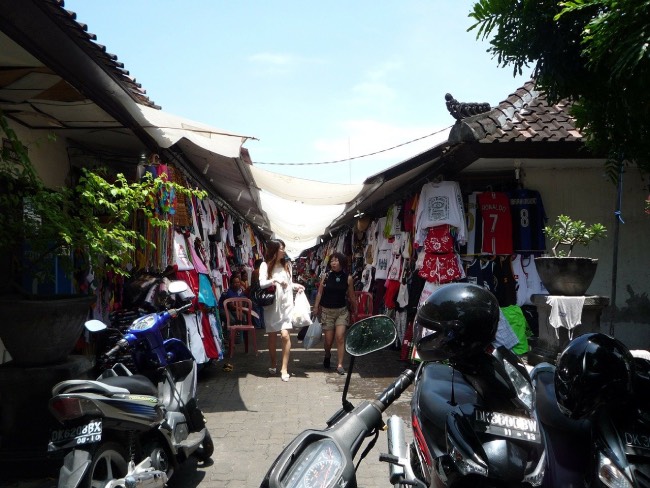
This phrase can be extremely useful, especially for solo female travellers. The thing is, if you are busy shopping on a crowded street or market, it may be difficult for you to find a washroom. And more often, there are very few washrooms in such areas. So, you may have to visit a mall or a restaurant to use the washroom. This is where the phrase will come in handy. However, make sure that you ask the stall and shop owners for the washroom. Because just like you, other visitors may not know about the washroom either!
If you are shy about using this phrase with any local in Bali, you can approach the Balinese women for help!
15. Saya mau pesan [name of the dish]
Pronunciation: saa-yah maa-oo pe-san [name of the dish]
Translation: I want to order [name of the dish]
By the translation of this phrase, you might have understood where to use it. However, you can point at the menu card and place your order too. But that may look a bit rude. And since this phrase is quite easy to learn, using it while ordering your food would be more polite.
16. Permisi, jangan terlalu pedas
Pronunciation: per-me-see jaan-gan ter-laa-luh pe-dash
Translation: excuse me, don’t make it too spicy
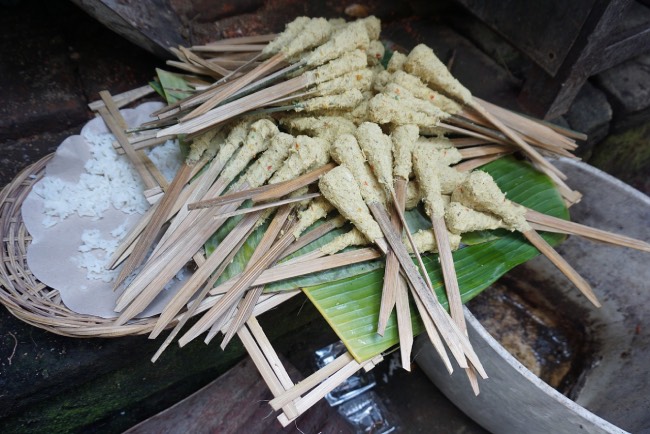
Balinese cuisine is some of the best in the world! And you should definitely check out the authentic Balinese restaurants that serve lip-smacking food on your solo trip to Bali.
Some of the traditional food items are a little spicy. If you are someone who does not like your meals to be extra spicy, this phrase will come in handy! Most of the restaurants in Bali mention the level of spiciness of each dish right next to its name on the menu card. You can use this phrase after placing your order to let the staff know that you would prefer a lesser amount of spices in your food!
17. Berapa harganya
Pronunciation: ber-raa-pah har-gah-nyaah
Translation: how much is this for?
Bali has a whole lot of shopping streets for you to check out. More often, you will be using this phrase only during street shopping as malls usually have a fixed price written on their products. And while in the street shops of Bali, make sure you use all your bargaining skills to get some amazing deals!
18. Terlalu mahal
Pronunciation: ter-laa-luh ma-hal
Translation: it’s too expensive
Sometimes, it is okay to tell a seller that the item is too expensive. So don’t shy away from using this phrase. If you think the seller will reduce the price a little, bargain as much as you can. But if the seller’s face says that they will not reduce the price by even one rupiah, leave the stall and move on to the next one! It is important to know when to use which phrase and where to bargain.
Balinese shopping streets are huge in number, and each one is better than the other, so you will probably find something you like at another place!
19. Ini – itu
Pronunciation: ee-nee – ee-tu
Translation: this one – that one
These two small words can be very helpful when you go shopping in Bali, especially street shopping. Instead of simply pointing at items in the shop, using these words will help you avoid looking like the odd one out!
20. Tolong bawa aku ke [name of the place]
Pronunciation: toh-long ba-wah a-kuh ke [name of the place]
Translation: I want to go to [name of the place], please
When you travel from one destination to another in Bali, you might have to take a cab or taxi. This is where this phrase will come in handy. However, you can rent a car or bike if you are confident in your driving or riding skills. But if you are not, taking a taxi or cab is the next best thing. You can use this phrase and ask the taxi drivers if they can take you to your destination.
So, how many Balinese words/phrases have you already learned?
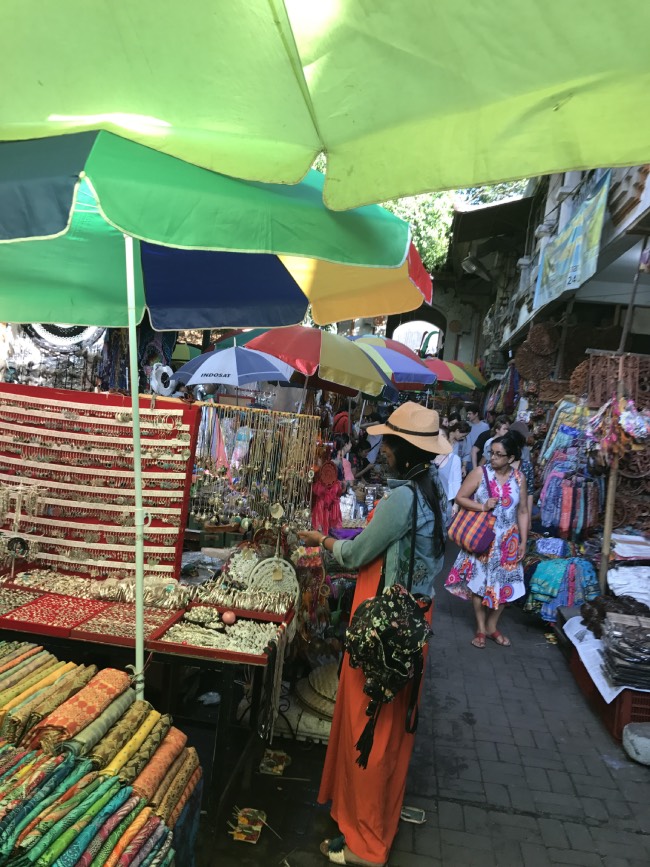
Phew! That was quite a list, huh? But all these words/phrases are quite easy to learn. If you find it difficult to learn these words, you can save this blog for further reference and go through it whenever needed!
The locals in Bali are very warm and friendly towards tourists. If they see you making an effort to learn their language, they will appreciate it and help you in any way possible! So make it a point to put in some effort while you go about exploring the beautiful island.
I had learned these phrases and words before visiting Bali on my first ever solo trip. Not going to lie, I was a bit conscious about the pronunciation of these phrases, but the people were extremely helpful! I met some amazing female travellers and even made a few friends in Bali, which is kind of a big deal for an introvert like me lol.
If you found this blog helpful, do let me know in the comments below. I would love to know about your experiences on your solo trip to the island! Till then, happy travelling, ladies!



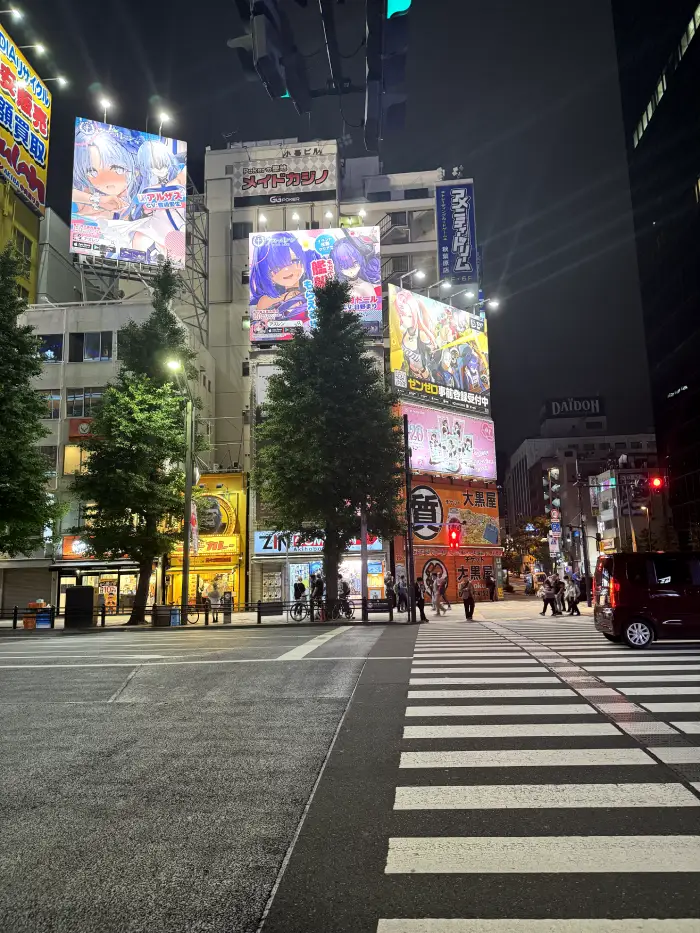




Leave a Reply